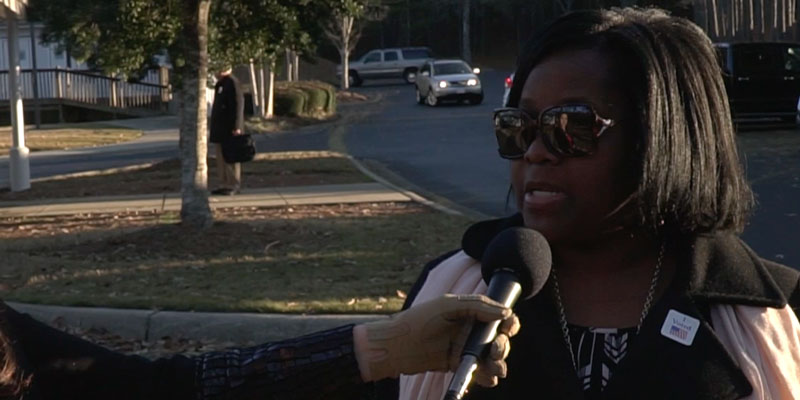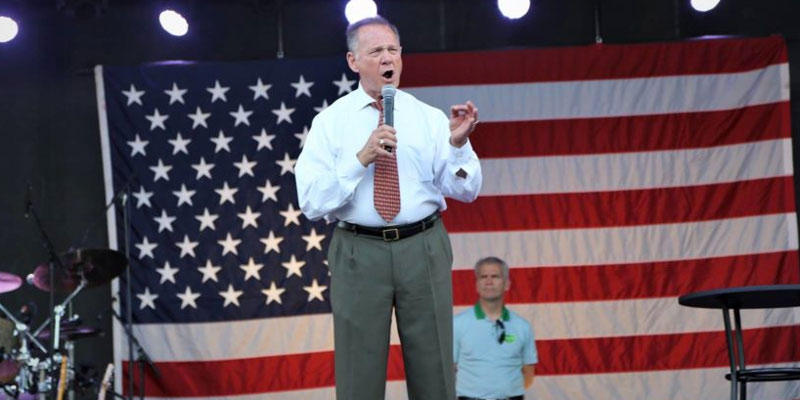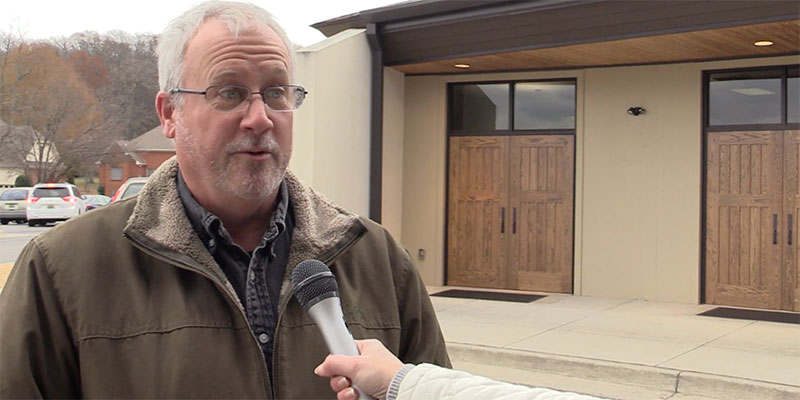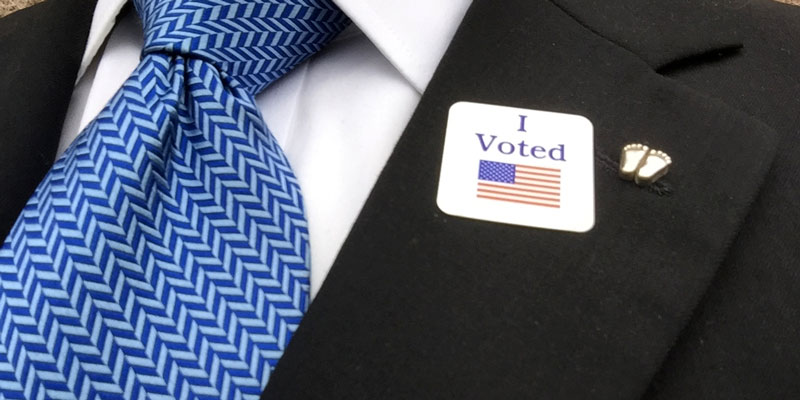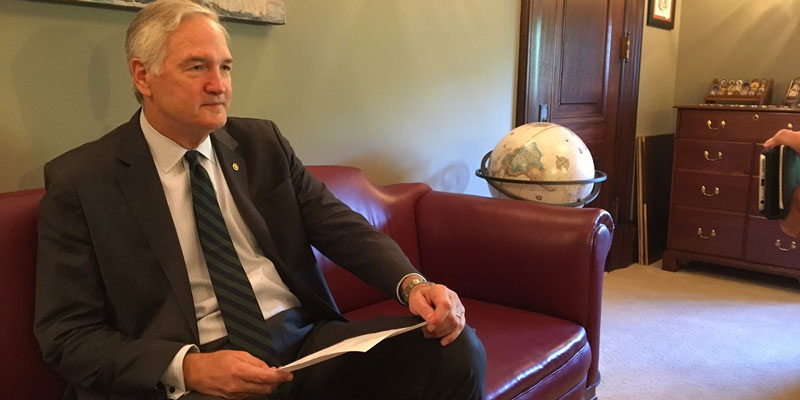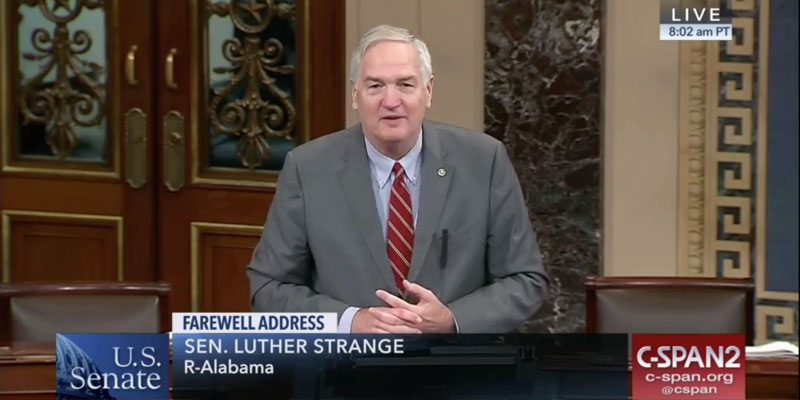
Sen. Luther Strange addressed his fellow senators for the final time Thursday.
“After nearly a year in this chamber, I am both its newest member and the next to depart. As such, I have both the optimisim of a young student and the battle scars of a man in the arena.”
Strange offered this praise of his Alabama role models:
“Together, Jeff Sessions and Richard Shelby represent the finest Alabama has to offer to our nation. Following in their footsteps here in the Senate is an honor I will forever treasure.”
Read the entire speech below and watch the video here:
Senator Luther Strange Dec. 7 Farewell Address:
Mr. President, I rise today to address my colleagues for the last time. After nearly a year in this chamber, I am both its newest member and the next to depart. As such, I have both the optimism of a young student and the battle scars of a man in the arena. Today, I’d like to offer my colleagues some observations from the perspective of my unique circumstances.
My fellow Senators and I come from different places. We were raised differently, and we have lived differently. In coming to serve in the world’s greatest deliberative body, we have carried and tested different notions of America.
There is, however, one reality that transcends our individual experiences. In this room, we are each humbled by history. The Senate has been a forum for some of the great debates of our Republic. It has shaped, and been shaped by, citizen legislators from every state of the Union. We are awed by the strength of an institution that has weathered great challenges, and the wisdom of those who first envisioned it.
As I rise today in that spirit, I’d like to shed light on a page of Senate history that bears great significance in our current political climate.
Mr. President, across the hall behind you is a space known as the Marble Room. In a building that is home to so many breathtaking historic sights, this alcove has a singular beauty, and a story worth telling.
As part of the 1850s expansion of the Senate’s chambers, the Marble Room began as a public gathering place, and has been frequented over the decades by politicians and protesters alike. When the Union army camped on the grounds of the Capitol during the Civil War, soldiers even used its fireplaces for cooking.
For over sixty years, the Marble Room was steeped in the life of the American citizen. It hosted meetings with advocates, constituents, and the free press. It became a very tangible example of our nation’s experiment in representative government.
In March, 1921, it took on a new, equally important purpose. The space was reserved by the Rules Committee as an escape for Senators from the crowded halls of the Capitol, and the windowless, smoke-filled rooms where they often gathered off the floor.
It became the place where Senators of all stripes would come to catch their breath and take their armor off. Some would nap, some would eat lunch, and all would end up forming bonds that rose above politics.
Today, the Marble Room is nearly always empty. This emptiness symbolizes something that worries me about today’s politics. It is likely both a symptom and a cause of the partisan gridlock that often dominates this chamber.
But the story of that room – the interplay between citizen and institution; between pragmatism and principle – is the story of the Senate, and in some ways the story of republican government in America.
Mr. President, what was once an incubator for collegiality and bipartisanship has become a glaring reminder of the divisions that we have allowed to distract us from the business of the American people.
We each remain humbled by the history of the Marble Room. We stand in awe of the traditions of this hallowed body. But too often we fail to let this history be our guide through today’s political challenges.
Mr. President, my time in the Senate has reinforced for me what it means to balance principle and pragmatism, to serve the people of my state honorably, and it has taught me how to navigate the turbulent waters of Washington.
I imagine that our predecessors who spent time together in the Marble Room wrestled with similar questions. After all, the issues we face today are not all that different. This body has been strained before – it has bent, but not broken.
Finding lasting solutions to our nation’s problems does not require reinventing the wheel. Our forefathers have done it before, and they’ve done it right across the hall.
—
Mr. President, I spent my early years growing up in Sylacauga, Alabama, about 40 miles outside of Birmingham. My first hometown is known as “the Marble City” for the swath of high-quality stone it sits on, 32 miles long and as much as 600 feet deep.
Sylacauga marble is widely recognized for its pure white color and fine texture, and here in Washington, we are surrounded by it. It is set into the ceiling of the Lincoln Memorial, the halls of the Supreme Court, and was used by renowned sculptor Gutzon Borglum to create the bust of Abraham Lincoln on display in the crypt downstairs.
Sylacauga marble is used in places infused with tradition and deep history. It is used to enshrine important landmarks. It ensures that memories of the past will stand the test of time to inform the decisions of the future.
In a small house in the Marble City, I was raised by a family that instilled in me a deep and abiding reverence for history and tradition.
My father was a Navy veteran and my only uncle, a West Point graduate killed in service during World War II, was actually born on the 4th of July.
As you can imagine, Mr. President, I didn’t need fireworks or parades to understand the significance of our Independence Day – the look in my mother’s eyes as she remembered her brother’s birthday was enough.
Forged in service and sacrifice, my family understood the blessing of living in America, and the price of passing its freedoms on to the next generation.
Thanks to this generation before me – the greatest generation – I grew up strong in Alabama. At a young age, I was introduced to the Boy Scouts of America. From volunteer troop leaders to the older scouts I would look to as examples, the Boy Scouts created an environment of selfless service. As a Scout, I learned to appreciate the institutions of American society, and my role as a citizen.
By age thirteen, I was an Eagle Scout traveling to Washington on a school trip to see this great experiment in representative government up close. As I tell every young person who has visited my office this year, that experience gave me an appreciation of the value of public service.
Mr. President, I often wonder, if we all approached our duties here with the unblemished optimism of a young student on a field trip, whether we couldn’t accomplish more in Congress.
Of course, the strength of this body and the remarkable foresight of our Founders run deeper than an elementary school civics class. For me, the next pivotal moment came as an undergraduate at Tulane University in the spring and summer of 1973.
Some of you may be surprised to learn that I played basketball in college. In between practice and part-time jobs, I found time to watch the newly-formed Senate Select Committee on Presidential Campaign Activities begin its investigation of the Watergate scandal.
In that moment, our nation stepped into uncharted territory. The strength of our Constitution was tested like never before. Would the pursuit of justice overcome politics? Would the institution of the Presidency be forever changed? What are the responsibilities of citizens of a republic, when the republic’s institutions are tested?
It was during that spring semester of 1973 that I began to understand the tremendous power of the rule of law. It is guarded by representatives who swear to preserve, protect and defend the Constitution of the United States.
When my basketball playing years ran out, it was this realization that led me to go to law school. My new game would be learning the ins and outs of this system that ensured the rights our Founders envisioned. My new team would be my fellow students, who would go on to practice law and serve our nation at all levels of government.
Mr. President, as so many of our colleagues know, the path from practicing law to writing it is well-traveled. I was fortunate to travel it with the help of some of Alabama’s finest public servants.
As a young attorney, I first met one of them for breakfast in the cafeteria of the Department of Justice. When I realized I had forgotten my wallet, he paid for my meal. Jeff Sessions has continued to pay it forward to this day as a dear friend and mentor of mine.
Mr. President, Jeff Sessions is both a gracious statesman and a man of principle. It is not far-fetched to say that some of this temperament rubbed off on him from our state’s senior Senator, Richard Shelby.
Over thirty years ago, I was introduced to then-Congressman Shelby by my friend, former Secretary of the Senate Joe Stewart. As a young lawyer, I learned from a man fast-becoming a legendary legislator. He would become one of my most treasured friends, sharing many days hunting together in the fields of Alabama and elsewhere, and many more stories shared here in the halls of the Capitol.
Together, Jeff Sessions and Richard Shelby represent the finest Alabama has to offer to our nation. Following in their footsteps here in the Senate is an honor I will forever treasure.
The example of these men inspired me to get involved in public service. As the Attorney General of Alabama, and Senators, they approached elected office with an unparalleled reverence for the rule of law.
I spoke earlier about the balance of pragmatism and principle, and in doing so I had my friends in mind. When I was elected Attorney General of Alabama in 2010, I drew heavily on their examples of principled conservative leadership.
Mr. President, in this body we are too often convinced that standing for deeply-held principles is incompatible with pragmatism. In the six years I served as Attorney General, I learned that this could not be further from the truth.
Serving my state in that capacity required balance above all else. I had an obligation to the people of Alabama who elected me to fight for the conservative victories they were counting on. I also had a solemn duty to rise above politics and follow the law and the truth wherever they led.
Make no mistake – during my two terms as Attorney General, I took every opportunity to defend the Constitution, the rule of law, and the people of Alabama against federal government overreach.
Together with other state Attorneys General, I worked to protect farmers and ranchers from an EPA rule that would turn puddles in their fields into federally-regulated ecosystems. We stood up against threats to religious liberty and the Second Amendment, and took the fight over an illegal executive amnesty program all the way to the U.S. Supreme Court. On these, and many other issues, we stood for the rule of law and we won.
So, Mr. President, I don’t have to prove my commitment to conservative principles.
At the same time, I have a record of upholding the rule of law even when my own party goes astray. I have the scars to show for it. Over my six years in the state capitol of Montgomery, I assembled a nationally-renowned team of prosecutors behind a common goal: to root out public corruption.
This pursuit led to the convictions of several corrupt public officials in the state of Alabama, including a county sheriff complicit in human trafficking – the first successful prosecution of its kind in decades.
My team took on Alabama’s Republican Speaker of the House for ethics violations, leading to his removal from office and a prison sentence. As you might imagine, we didn’t make many friends in the political establishment by doing so, but we shored up public trust in our representative government.
For their commitment to fighting public corruption, my team has been recognized by the National Association of Attorneys General as a gold standard. I’ve personally had the opportunity to address my former colleagues from both sides of aisle who are focusing on the same goal in their own states. More than any fleeting partisan achievement, it is work like this of which I am the most proud.
When faced with crises, we rose to a calling higher than politics. After the tragic Deepwater Horizon oil spill of 2010 decimated communities and ecosystems along the Gulf Coast, I was appointed by the Court as coordinating counsel for the Gulf Coast states in the historic litigation. My team won the trial and negotiated a $2.3 billion dollar settlement for the state of Alabama.
Our work on the spill case built consensus and found common ground. It brought together the interests of fiscal conservatives and environmental advocates, and we delivered results because it was the right thing to do. While victims of the Alaska spill in 1989 waited 22 years for settlement, the Attorney General’s office delivered justice and set a gold standard for responding quickly and effectively to the needs of Gulf Coast communities.
After all, Mr. President, the institutions our founders laid out in the Constitution are only as strong as the people’s belief in their strength. When America no longer trusts that its representatives are remaining true to their oaths, the entire system loses its value.
As the most recent Senator to take the oath, I remember the feeling of the Bible under my left hand. I remember reflecting on a verse it contains that has brought me peace in times of challenge. Proverbs 19:21 says “Many are the plans in a person’s heart, but it is the Lord’s purpose that prevails.”
I remember raising my right hand, here in the well where so many others have gone before – many of whom likely found it difficult to discern what exactly the Lord’s purpose was in that moment.
Each of them came to this body in the face of significant national challenges. Some faced violent conflict, others an economic crisis.
Our forebears would not be surprised by the issues before this body today. But I do believe they would be surprised, and discouraged, by the emptiness of the Marble Room.
—
Mr. President, the policy challenges we face are not new ones. This body debates a budget resolution every single year. Many years, it also faces questions of war and conflict overseas. At least once every decade or so, it faces some tectonic crisis of the economy.
As a lifelong student of history, I am reassured by stories of the grave crises that have been addressed on this very floor. In this chamber, the post-Civil War Senate ensured that the nation stayed the course of healing and reunification. In this chamber, the Senate put politics aside to defeat the rise of fascism in Europe, and guided the creation of a new 20th century world order.
On this floor, long-overdue support for civil rights was won, vote by vote. This struggle is held vividly in the memory of my home state. In the early 1960s, my elementary school outside Birmingham was segregated. By 1971, I was taking the court with three young black men – teammates, classmates and friends – to play for the state basketball championship.
As our nation evolves, the traditions and history of the Senate demand that this institution meet each new challenge, armed with the will of the American people.
And as I watched with the rest of the country, it was on this floor that the Senate restored faith in our institutions by delivering justice after Watergate.
The idea that the chaos and upheaval that we see today are somehow unique falls flat in the face of monumental history. Pundits and politicians alike are too quick to speak in superlatives, but chaos and change are nothing new.
The Senate was designed to endure, and rooms of marble are built to last.
Studying Senate history puts the issues of today in perspective, but it also sheds light on the true challenge of our generation – a newer, more serious threat to the future of this institution and its traditions.
You see, the Senate was designed to accommodate conflict and profound disagreement. It was not, however, designed to tolerate the entrenched factionalism that dominates today’s proceedings. It was not designed for the people’s representatives to hunker down in private rooms, emerging only long enough to cast votes.
There are a hundred seats in this chamber. Each was contested and hard-earned, but they are rarely all occupied. The cameras likely don’t show it from this angle, but many of them before me today are empty.
The less time we spend in the same room, the easier it becomes to view our colleagues on the other side of the aisle as obstacles instead of opportunities.
What do I mean by opportunities?
Mr. President, our generation of leaders will be judged by history on whether we strove to heal the divisions of this body and our nation. In pursuit of that goal, every member of this body is an opportunity to grow in understanding.
And yet, compromise has become a dirty word in American politics, and it’s a serious threat to our hopes of advancing meaningful policy.
It seems that reasonable Americans understand what we are called to do better than we do. A farmer in Alabama once told me that “if my wife sends me to the store to buy a dozen eggs and there are only a half dozen left, I’ll come home with a half dozen.”
On this floor, we have the power to bring home a half dozen eggs, and even make it a dozen for the American people. We have the power to be a profound force for good.
After all, compromise was baked into the Founders’ design. At the heart of our system of checks and balances is an understanding that no one branch, and certainly no one partisan faction, will get everything it wants, all the time.
From the very beginning, compromise allowed our nation to embrace both the republicanism of Thomas Jefferson and the federalism of Alexander Hamilton. The very structure of this body is a result of the Connecticut Compromise of 1787, which accommodated proponents of both equal and proportional representation.
The authors of this pragmatic solution, Roger Sherman and Oliver Ellsworth, are depicted on the wall outside this chamber, not far from the Marble Room, where their example of finding common ground would be practiced for years to come.
Mr. President, in the shadow of these founding debates, political voices today are arguing louder and louder about smaller and smaller things. It is easy for those outside this chamber to insist that they know what should be done. As long as we remain so deeply divided, these outside voices will always win.
When I leave the Senate, I hope to have lived up to the words of a different voice. On April 23, 1910, in a time of change, as the United States was coming to define a new world order, President Teddy Roosevelt delivered a now-famous message, which bears repeating:
“It is not the critic who counts; not the man who points out how the strong man stumbles, or where the doer of deeds could have done them better.
“The credit belongs to the man who is actually in the arena, whose face is marred by dust and sweat and blood; who strives valiantly; who errs, who comes short again and again, because there is no effort without error and shortcoming; but who actually strive to do the deeds; who knows great enthusiasm, the great devotions; who spends himself in a worthy cause; who at the best knows in the end the triumph of high achievement, and who at the worst, if he fails, at least fails while daring greatly, so that his place shall never be with those cold and timid souls who neither know victory nor defeat.”
Here today, our nation faces challenges like it did during Watergate 43 years ago, and like it did in the time of Roosevelt 107 years ago. When we have each left this great body, I know we would like to be remembered as men and women in the arena – as people who spent themselves in worthy causes.
I am convinced – the worthiest cause we can join today is a return to the collegiality, the pragmatism, and yes, the compromise, of the Marble Room.
—
Mr. President, as I leave the Senate, I am indebted to so many – to those who have helped me become the man I am today, to the colleagues who have welcomed me as a partner in the people’s business, and to the great state of Alabama which I have had the immense honor to serve.
I thank God every day for the blessing of my wife, Melissa, my children and grandchildren. Greeting every day assured by their love and support has made my work here possible.
I thank my staff in Alabama and here in Washington, who have risen to the task of serving our great state through troubling times. Their tireless dedication reminds me that there is a bright future within reach.
I thank the staff of the Senate serving here on the floor and in the cloakrooms, the U.S. Capitol Police, and all those who preserve, protect, and defend this hallowed institution.
I thank each of my colleagues for the privilege of joining them in service. The friends and working partners I have found here in the Senate give me great hope that in the right hands, this experiment in representative government will long endure.
I thank the men of principle who have served Alabama with honor for years before me – Jeff Sessions, for his example of deep reverence for this institution, and Richard Shelby, especially for his friendship and guidance during my time in the Senate.
Finally, Mr. President, I thank the people of my state. Alabama is a beautiful place, and millions of hardworking people call it home. As I look back on my career, I am most proud of the last seven years I have spent working on their behalf, both in Montgomery and here in Washington.
—
Mr. President, in preparing my remarks for today, I spent a lot of time in the Marble Room. I reflected on the stone that built it, and the bedrock of my hometown.
I thought about the lawmakers who frequented it years ago. I thought about the challenges they faced – their own principled stands and pragmatic negotiations. Most importantly, I thought about the common ground they found there. Off the record and away from the cameras, this space presents us with an opportunity to once again find balance.
Balance between principle and pragmatism in the Senate would reflect the very spirit of America, which is defined by balance.
The zeal for adventure that won the West and put human footsteps on the face of the Moon is balanced by a reverence for tradition and our founding principles – individual liberty, the rule of law, and the pursuit of happiness.
The entrepreneurial drive that built great cities and today drives innovators to ask “what’s next” is balanced by a solemn remembrance of the struggle and sacrifice that have paved the way.
The Senate is the sacred place that was designed to embrace this spirit of America; to lose the art of balance and compromise in this body is to lose something essentially American.
If we cannot find shared cause – shared purpose – in the quiet corners of that space across the hall, then we may never find it here on the floor of the Senate, where the critics are so quick to point out how “the doers of deeds could have done them better.” As I prepare to leave this esteemed body, I urge my colleagues, who will face many more challenges ahead, to take these words to heart.
For the sake of our nation, I urge them to return to the Marble Room.
Mr. President, I yield the floor.







